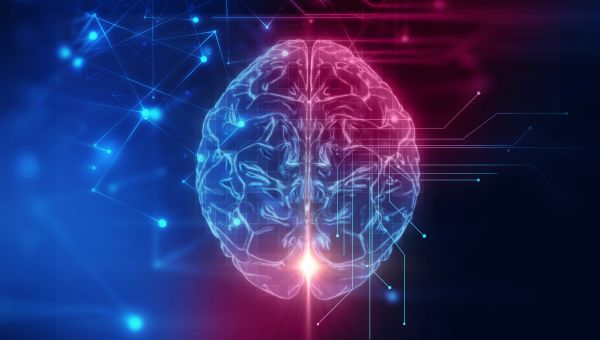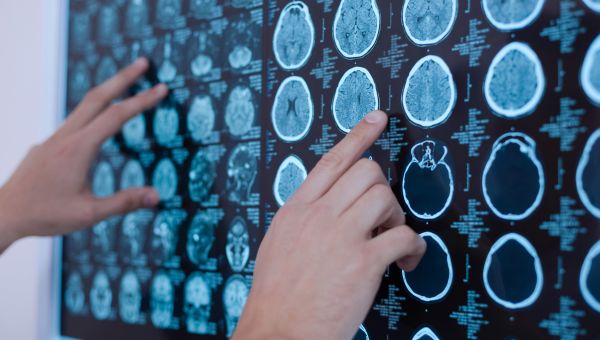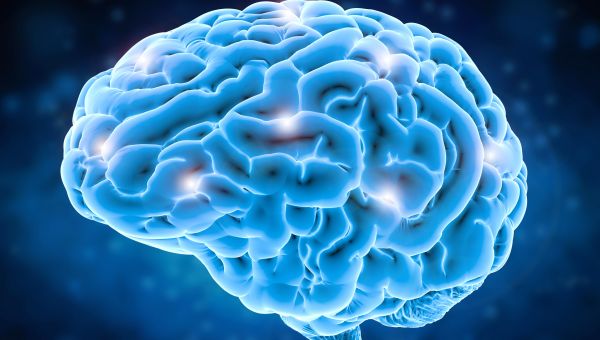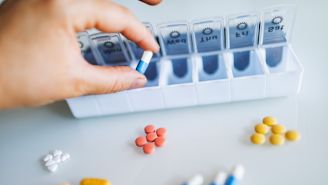5 amazing facts about your brain
Learn five fascinating facts about your brain, plus how to slow down brain decline.
Updated on November 4, 2024

The brain is a highly complex organ in which 86 billion nerve cells, or neurons, constantly talk to each other. All these connections are what make you feel pain when someone steps on your foot, laugh when you hear a joke, or remember where you left your phone.
The largest part of the brain is the cerebrum. It has the wrinkles and folds that you may picture when… Show More
The brain is a highly complex organ in which 86 billion nerve cells, or neurons, constantly talk to each other. All these connections are what make you feel pain when someone steps on your foot, laugh when you hear a joke, or remember where you left your phone.
The largest part of the brain is the cerebrum. It has the wrinkles and folds that you may picture when you think of the brain. This region is covered by the cerebral cortex, the outermost layer that’s often called “gray matter.” The cerebrum handles higher brain functions like thoughts, emotions, sensory processing, and actions. Those folds and wrinkles provide more surface area for more information to be processed.
The brainstem is the powerhouse link between your brain and your spinal cord. It controls your heart rate, blood pressure, and breathing. The cerebellum, meanwhile, is a wrinkled ball-shaped part of the brain. It sits behind the rest of your brain. It helps coordinate movement by working with sensory information from your eyes, ears, and muscles.
Although the brain is immensely complicated, researchers have managed to uncover many fascinating truths about it.
Show Less
The brain isn’t fully developed until your twenties
It was previously believed that the brain stopped growing by puberty. Now researchers know that the brain continues to develop well into your twenties. In fact, the frontal lobes, which are important for planning and impulse control, are among the last parts to fully develop.
The brain constantly… Show More
It was previously believed that the brain stopped growing by puberty. Now researchers know that the brain continues to develop well into your twenties. In fact, the frontal lobes, which are important for planning and impulse control, are among the last parts to fully develop.
The brain constantly matures throughout childhood and adolescence. The areas responsible for memory, language, creativity, and attention are among those that continue to undergo changes.
Gray matter growth peaks right before age six. After this stage, the prefrontal cortex, which makes up the part of your brain responsible for judgement, becomes more developed. White matter volume, or the number of new brain connections, peaks shortly before the age of 29.
Although children do already have some impulse control and can start to learn how to plan and set goals, their ability to use these skills becomes more consistent as they get older. So don’t be surprised if your decision-making skills got a lot better well into your twenties.
Show Less
The brain shrinks over time, and several factors can influence it
Brain volume naturally shrinks with age at a rate of about 0.2 percent each year after the age of 35, and this speeds up over time until it’s about 0.5 percent of loss per year by age 60. While the loss of brain volume doesn’t correlate to a lower IQ, in some cases it signals some loss of quick-… Show More
Brain volume naturally shrinks with age at a rate of about 0.2 percent each year after the age of 35, and this speeds up over time until it’s about 0.5 percent of loss per year by age 60. While the loss of brain volume doesn’t correlate to a lower IQ, in some cases it signals some loss of quick-thinking skills. However, some factors may be under your control that can speed up brain shrinkage.
Healthy habits may be able to lower your risk factors for excessive brain shrinkage. Here’s what to aim for:
- Follow a healthy, low-cholesterol diet (like the Mediterranean diet).
- Get aerobic exercise every day. According to the National Institute on Aging, research has repeatedly suggested that older adults who are more physically active have slower rates of cognitive decline.
- Try to get adequate sleep each night.
- Manage your stress.
- Manage medical conditions like blood pressure, cholesterol, and diabetes.
- Don’t smoke.
- Drink less alcohol.

We use a lot more than 10 percent of our brainpower
It’s a myth that we only use 10 percent of the brain. The truth is, we use all of it. Even when you think your brain is inactive, such as when you sleep, it’s hard at work, doing things like forming new neural pathways so you can learn and remember.
The 10 percent idea originated in the early… Show More
It’s a myth that we only use 10 percent of the brain. The truth is, we use all of it. Even when you think your brain is inactive, such as when you sleep, it’s hard at work, doing things like forming new neural pathways so you can learn and remember.
The 10 percent idea originated in the early 1900s, likely with a famous psychologist named William James, who taught that people have immense untapped mental potential. Spread by others, including science fiction writers, that myth fueled the self-help market, and it’s been repeated to this day.
Throughout life, you can learn new things and new ways of thinking. Regular exercise and keeping your brain active with things like dance or music may help boost brain health.
Show Less
There is no left-brain/right-brain personality type
You might be great at solving math problems, while your best friend is an amazing musician. But contrary to popular belief, that doesn’t make you “left-brained” or your friend “right-brained.”
It’s true that the human brain has a right and a left hemisphere. In most people, the left side controls… Show More
You might be great at solving math problems, while your best friend is an amazing musician. But contrary to popular belief, that doesn’t make you “left-brained” or your friend “right-brained.”
It’s true that the human brain has a right and a left hemisphere. In most people, the left side controls the muscles on the right side of the body, and the right hemisphere controls the left side of the body. But complex thought draws on both sides of the brain.
In fact, rather than hemispheres, scientists generally divide the brain into lobes. Each of the four lobes—frontal, temporal, parietal, and occipital—plays an important role in different aspects of behavior and thought.
The frontal lobe, near the forehead, tends to be involved with decision-making, movement, smell recognition, and speech. The parietal lobe is in the middle of the brain and plays an important role in recognizing pain, touch, and spatial relationships. It also helps a person understand others when they speak.
The occipital lobe is at the back of the brain and helps a person process what their eyes see. And lastly, the temporal lobe plays a big role for short-term memory, musical rhythm, and recognizing scents. Like the frontal lobe, it also helps with speech.
Show Less
Your brain doesn't like the cold
Have you ever had an ice-cold drink or ice cream and felt a sudden stabbing pain in your head?
Most people call this ice-cream headache or brain freeze, and there’s actually a scientific term for it: sphenopalatine ganglioneuralgia. Try saying that with a mouthful of ice cream!
The sharp pain can… Show More
Have you ever had an ice-cold drink or ice cream and felt a sudden stabbing pain in your head?
Most people call this ice-cream headache or brain freeze, and there’s actually a scientific term for it: sphenopalatine ganglioneuralgia. Try saying that with a mouthful of ice cream!
The sharp pain can be triggered either by exposure to something cold, like drinking or eating something very cold too fast, or by exposing your head to very cold temperatures.
Here’s why scientists think it happens: Blood vessels that feed your brain pass near the roof of your mouth. When you eat or drink something cold, they reflexively constrict to preserve your body heat. Then they dilate. That fast re-expansion sends a pain signal to your brain through a nerve called the trigeminal nerve, which causes a quick burst of pain in your face and forehead. Thankfully, “brain freeze” typically doesn’t last more than a couple of seconds.
Show Less
Caruso, Catherine. “A New Field of Neuroscience Aims to Map Connections in the Brain.” Harvard Medical School. January 19, 2023.
National Cancer Institute. Cerebrum. Page accessed May 25, 2024.
Johns Hopkins Medicine. Brain Anatomy and How the Brain Works. Page accessed May 25, 2024.
Abrams, Zara. “What neuroscience tells us about the teenage brain.” American Psychological Association. Page last updated August 25, 2022.
National Institute of Mental Health. The Teen Brain: 7 Things to Know. Page accessed May 25, 2024.
Brierley, Craig. “Brain charts: Mapping the rapid growth and slow decline of the human brain over our lifetime.” University of Cambridge. April 6, 2022.
National Institute on Aging. How the Aging Brain Affects Thinking. Page last reviewed June 27, 2023.
Blinkouskaya Y, Caçoilo A, Gollamudi T, Jalalian S, Weickenmeier J. Brain aging mechanisms with mechanical manifestations. Mech Ageing Dev. 2021 Dec;200:111575.
Cleveland Clinic. Brain Atrophy. Page last reviewed March 10, 2022.
National Institute on Aging. How the Aging Brain Affects Thinking. Page last reviewed June 27, 2023.
McGovern Institute. The human brain houses incredibly complex and advanced functions—but do we only access a fraction of it? Page accessed May 25, 2024.
National Institute of Neurological Disorders and Stroke. Brain Basics: Understanding Sleep. Page last reviewed July 19, 2023.
Shmerling, Robert. “Right brain/left brain, right?” Harvard Health Publishing. March 24, 2022.
National Cancer Institute. Cerebral hemisphere. Page accessed May 25, 2024.
Johns Hopkins Medicine. Brain Anatomy and How the Brain Works. Page accessed May 25, 2024.
Johns Hopkins Medicine. How to Ease Brain Freeze. Page accessed May 25, 2024.
More On


video

article

slideshow


video


video
